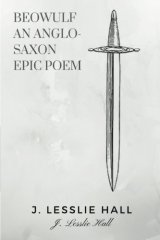Beowulf
Beowulf is an Old English epic poem consisting of 3,182 alliterative lines. It is one of the most important works of Old English literature. The date of composition is a matter of contention among scholars; the only certain dating pertains to the manuscript, which was produced between 975 and 1025.
PREFACE. The present work is a modest effort to reproduce approximately, in modern measures, the venerable epic, Beowulf. Approximately, I repeat; for a very close reproduction of Anglo-Saxon verse would, to a large extent, be prose to a modern ear. The Heyne-Socin text and glossary have been closely followed. Occasionally a deviation has been made, but always for what seemed good and sufficient reason. The translator does not aim to be an editor. Once in a while, however, he has added a conjecture of his own to the emendations quoted from the criticisms of other students of the poem. This work is addressed to two classes of readers. From both of these alike the translator begs sympathy and co-operation. The Anglo-Saxon scholar he hopes to please by adhering faithfully to the original. The student of English literature he aims to interest by giving him, in modern garb, the most ancient epic of our race. This is a bold and venturesome undertaking; and yet there must be some students of the Teutonic past willing to follow even a daring guide, if they may read in modern phrases of the sorrows of Hrothgar, of the prowess of Beowulf, and of the feelings that stirred the hearts of our forefathers in their primeval homes. In order to please the larger class of readers, a regular cadence has been used, a measure which, while retaining the essential characteristics of the original, permits the reader to see ahead of him in reading. Perhaps every Anglo-Saxon scholar has his own theory as to how Beowulf should be translated. Some have given us prose versions of what we believe to be a great poem. Is it any reflection on our honored Kemble and Arnold to say that their translations fail to show a layman that Beowulf is justly called our first epic? Of those translators who have used verse, several have written from what would seem a mistaken point of view. Is it proper, for instance, that the grave and solemn speeches of Beowulf and Hrothgar be put in ballad measures, tripping lightly and airily along? Or, again, is it fitting that the rough martial music of Anglo-Saxon verse be interpreted to us in the smooth measures of modern blank verse? Do we hear what has been beautifully called "the clanging tread of a warrior in mail"? [viii] Of all English translations of Beowulf, that of Professor Garnett alone gives any adequate idea of the chief characteristics of this great Teutonic epic. The measure used in the present translation is believed to be as near a reproduction of the original as modern English affords. The cadences closely resemble those used by Browning in some of his most striking poems. The four stresses of the Anglo-Saxon verse are retained, and as much thesis and anacrusis is allowed as is consistent with a regular cadence. Alliteration has been used to a large extent; but it was thought that modern ears would hardly tolerate it on every line. End-rhyme has been used occasionally; internal rhyme, sporadically. Both have some warrant in Anglo-Saxon poetry. (For end-rhyme, see 153, 154; for internal rhyme, 221, 640.) What Gummere[1] calls the "rime-giver" has been studiously kept; viz., the first accented syllable in the second half-verse always carries the alliteration; and the last accented syllable alliterates only sporadically. Alternate alliteration is occasionally used as in the original. (See 761, 85.) No two accented syllables have been brought together, except occasionally after a cæsural pause. (See 219 and 121.) Or, scientifically speaking, Sievers's C type has been avoided as not consonant with the plan of translation. Several of his types, however, constantly occur; e.g. A and a variant (/ x | / x) (/ x x | / x); B and a variant (x / | x / ) (x x / | x / ); a variant of D (/ x | / x x); E (/ x x | / ). Anacrusis gives further variety to the types used in the translation. The parallelisms of the original have been faithfully preserved. (E.g., 116 and 117: "Lord" and "Wielder of Glory"; 130, 131, 132; 212 and 213; 227 and 228; 35 and 36.) Occasionally, some loss has been sustained; but, on the other hand, a gain has here and there been made. The effort has been made to give a decided flavor of archaism to the translation. All words not in keeping with the spirit of the poem have been avoided. Again, though many archaic words have been used, there are none, it is believed, which are not found in standard modern poetry. [ix] With these preliminary remarks, it will not be amiss to give an outline of the story of the poem. THE STORY. Hrothgar, king of the Danes, or Scyldings, builds a great mead-hall, or palace, in which he hopes to feast his liegemen and to give them presents. The joy of king and retainers is, however, of short duration. Grendel, the monster, is seized with hateful jealousy. He cannot brook the sounds of joyance that reach him down in his fen-dwelling near the hall. Oft and anon he goes to the joyous building, bent on direful mischief. Thane after thane is ruthlessly carried off and devoured, while no one is found strong enough and bold enough to cope with the monster. For twelve years he persecutes Hrothgar and his vassals. Over sea, a day's voyage off, Beowulf, of the Geats, nephew of Higelac, king of the Geats, hears of Grendel's doings and of Hrothgar's misery. He resolves to crush the fell monster and relieve the aged king. With fourteen chosen companions, he sets sail for Dane-land. Reaching that country, he soon persuades Hrothgar of his ability to help him. The hours that elapse before night are spent in beer-drinking and conversation. When Hrothgar's bedtime comes he leaves the hall in charge of Beowulf, telling him that never before has he given to another the absolute wardship of his palace. All retire to rest, Beowulf, as it were, sleeping upon his arms. Grendel comes, the great march-stepper, bearing God's anger. He seizes and kills one of the sleeping warriors. Then he advances towards Beowulf. A fierce and desperate hand-to-hand struggle ensues. No arms are used, both combatants trusting to strength and hand-grip. Beowulf tears Grendel's shoulder from its socket, and the monster retreats to his den, howling and yelling with agony and fury. The wound is fatal. The next morning, at early dawn, warriors in numbers flock to the hall Heorot, to hear the news. Joy is boundless. Glee runs high. Hrothgar and his retainers are lavish of gratitude and of gifts. Grendel's mother, however, comes the next night to avenge his death. She is furious and raging. While Beowulf is sleeping in a room somewhat apart [x] from the quarters of the other warriors, she seizes one of Hrothgar's favorite counsellors, and carries him off and devours him. Beowulf is called. Determined to leave Heorot entirely purified, he arms himself, and goes down to look for the female monster. After traveling through the waters many hours, he meets her near the sea-bottom. She drags him to her den. There he sees Grendel lying dead. After a desperate and almost fatal struggle with the woman, he slays her, and swims upward in triumph, taking with him Grendel's head._
Translation
Translate and read this book in other languages:
Select another language:
- - Select -
- 简体中文 (Chinese - Simplified)
- 繁體中文 (Chinese - Traditional)
- Español (Spanish)
- Esperanto (Esperanto)
- 日本語 (Japanese)
- Português (Portuguese)
- Deutsch (German)
- العربية (Arabic)
- Français (French)
- Русский (Russian)
- ಕನ್ನಡ (Kannada)
- 한국어 (Korean)
- עברית (Hebrew)
- Gaeilge (Irish)
- Українська (Ukrainian)
- اردو (Urdu)
- Magyar (Hungarian)
- मानक हिन्दी (Hindi)
- Indonesia (Indonesian)
- Italiano (Italian)
- தமிழ் (Tamil)
- Türkçe (Turkish)
- తెలుగు (Telugu)
- ภาษาไทย (Thai)
- Tiếng Việt (Vietnamese)
- Čeština (Czech)
- Polski (Polish)
- Bahasa Indonesia (Indonesian)
- Românește (Romanian)
- Nederlands (Dutch)
- Ελληνικά (Greek)
- Latinum (Latin)
- Svenska (Swedish)
- Dansk (Danish)
- Suomi (Finnish)
- فارسی (Persian)
- ייִדיש (Yiddish)
- հայերեն (Armenian)
- Norsk (Norwegian)
- English (English)
Citation
Use the citation below to add this book to your bibliography:
Style:MLAChicagoAPA
"Beowulf Books." Literature.com. STANDS4 LLC, 2025. Web. 22 Feb. 2025. <https://www.literature.com/book/beowulf_945>.








Discuss this Beowulf book with the community:
Report Comment
We're doing our best to make sure our content is useful, accurate and safe.
If by any chance you spot an inappropriate comment while navigating through our website please use this form to let us know, and we'll take care of it shortly.
Attachment
You need to be logged in to favorite.
Log In